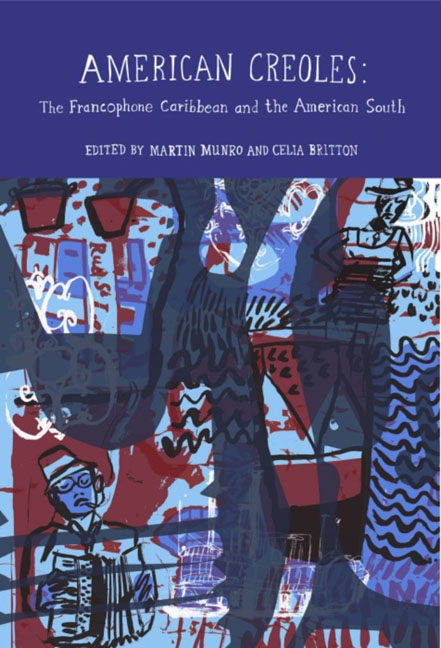Book contents
- Frontmatter
- Contents
- List of Illustrations
- Acknowledgements
- Introduction
- Creolizations
- Music
- Intertextualities: Faulkner, Glissant, Condé
- Go Slow Now: Saying the Unsayable in édouard Glissant's Reading of Faulkner
- Édouard Glissant and the Test of Faulkner's Modernism
- The Theme of the Ancestral Crime in the Novels of Faulkner, Glissant, and Condé
- An American Story
- Notes on Contributors
- Index
Go Slow Now: Saying the Unsayable in édouard Glissant's Reading of Faulkner
from Intertextualities: Faulkner, Glissant, Condé
- Frontmatter
- Contents
- List of Illustrations
- Acknowledgements
- Introduction
- Creolizations
- Music
- Intertextualities: Faulkner, Glissant, Condé
- Go Slow Now: Saying the Unsayable in édouard Glissant's Reading of Faulkner
- Édouard Glissant and the Test of Faulkner's Modernism
- The Theme of the Ancestral Crime in the Novels of Faulkner, Glissant, and Condé
- An American Story
- Notes on Contributors
- Index
Summary
‘Nous réclamons le droit à l'opacité’ [We demand the right to opacity]: this demand, articulated on the first pages of the Discours antillais [Caribbean Discourse] (Glissant, 1981: 11), resonates throughout Édouard Glissant's work. For Glissant, one way that literature can deploy opacity is to engage in a set of paired, paradoxical operations. It can say the unsayable, or make the invisible visible – or, more accurately put, present the absent. With his literary-critical text Faulkner, Mississippi, Glissant perceives both of these operations in the novels of an author whom he has hailed as the greatest of the twentieth century (Glissant, 1996: 54). This poetics of paradox is born of what Glissant sees as the shared cultural zone made up of the Caribbean and the US Gulf South region (cf. ibid.: 134, and passim). It is a poetics proper to this space; indeed, for Glissant, a literary method characterized by paradox and contradiction is necessitated by the particularity of this place or group of places.
In a rather contentious literary-historical formulation positing Faulkner as the genitor of a multilingual, pan-Caribbean poetics, Glissant holds that Caribbean writers ranging from Wilson Harris to Carpentier to Glissant himself have borrowed the langage [language] of Faulkner's literary practice (Glissant, 2005b). While this literary practice is peculiar to the US Gulf South-Caribbean region, this shared, paradoxical poetics, which Glissant suggests is aligned with the very force of life itself (Glissant, 1996: 139–40), has the potential to extend outward into other spaces and places. Glissant thus implies, as with his repeated assertion that ‘le monde entier s'archipélise et se créolise’ [the entire world is becoming archipelago-ized and creolized] (Glissant, 2005a: 25), that the Caribbean, and by extension the shared US Gulf South-Caribbean cultural zone, can point the way towards new and more desirable forms of thought and, subsequently, life.
The opacity demanded by Glissant's texts serves as a sort of protective mechanism insulating the radical difference of the other from the self's at times depredatory search for knowledge. Opacity thus dictates that in the other an unknowable remainder persists. Glissant's figure of opacity, as I will show, also proves to be applied to his own ideas (including the idea of opacity itself).
- Type
- Chapter
- Information
- American CreolesThe Francophone Caribbean and the American South, pp. 183 - 196Publisher: Liverpool University PressPrint publication year: 2012



